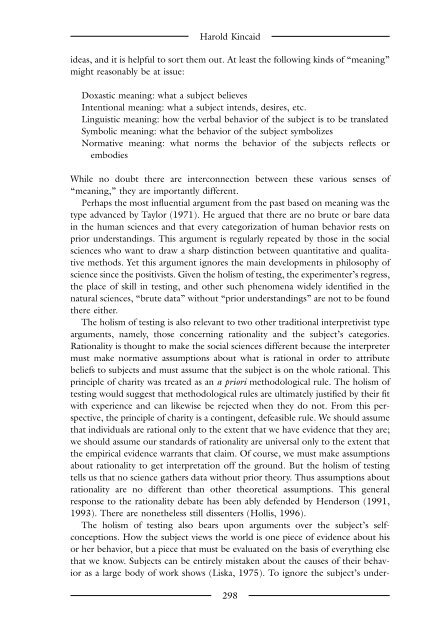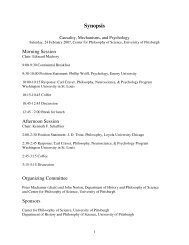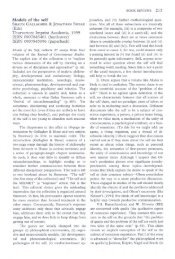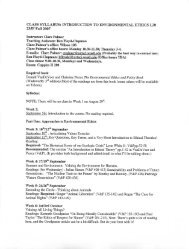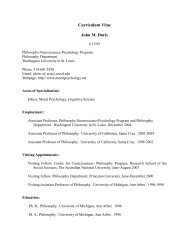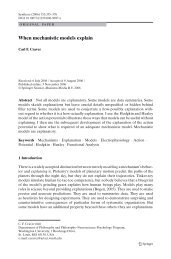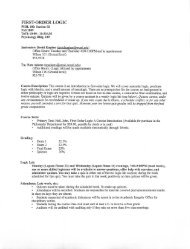The Blackwell Guide to the Philosophy of Science - The Department ...
The Blackwell Guide to the Philosophy of Science - The Department ...
The Blackwell Guide to the Philosophy of Science - The Department ...
You also want an ePaper? Increase the reach of your titles
YUMPU automatically turns print PDFs into web optimized ePapers that Google loves.
Harold Kincaid<br />
ideas, and it is helpful <strong>to</strong> sort <strong>the</strong>m out. At least <strong>the</strong> following kinds <strong>of</strong> “meaning”<br />
might reasonably be at issue:<br />
Doxastic meaning: what a subject believes<br />
Intentional meaning: what a subject intends, desires, etc.<br />
Linguistic meaning: how <strong>the</strong> verbal behavior <strong>of</strong> <strong>the</strong> subject is <strong>to</strong> be translated<br />
Symbolic meaning: what <strong>the</strong> behavior <strong>of</strong> <strong>the</strong> subject symbolizes<br />
Normative meaning: what norms <strong>the</strong> behavior <strong>of</strong> <strong>the</strong> subjects reflects or<br />
embodies<br />
While no doubt <strong>the</strong>re are interconnection between <strong>the</strong>se various senses <strong>of</strong><br />
“meaning,” <strong>the</strong>y are importantly different.<br />
Perhaps <strong>the</strong> most influential argument from <strong>the</strong> past based on meaning was <strong>the</strong><br />
type advanced by Taylor (1971). He argued that <strong>the</strong>re are no brute or bare data<br />
in <strong>the</strong> human sciences and that every categorization <strong>of</strong> human behavior rests on<br />
prior understandings. This argument is regularly repeated by those in <strong>the</strong> social<br />
sciences who want <strong>to</strong> draw a sharp distinction between quantitative and qualitative<br />
methods. Yet this argument ignores <strong>the</strong> main developments in philosophy <strong>of</strong><br />
science since <strong>the</strong> positivists. Given <strong>the</strong> holism <strong>of</strong> testing, <strong>the</strong> experimenter’s regress,<br />
<strong>the</strong> place <strong>of</strong> skill in testing, and o<strong>the</strong>r such phenomena widely identified in <strong>the</strong><br />
natural sciences, “brute data” without “prior understandings” are not <strong>to</strong> be found<br />
<strong>the</strong>re ei<strong>the</strong>r.<br />
<strong>The</strong> holism <strong>of</strong> testing is also relevant <strong>to</strong> two o<strong>the</strong>r traditional interpretivist type<br />
arguments, namely, those concerning rationality and <strong>the</strong> subject’s categories.<br />
Rationality is thought <strong>to</strong> make <strong>the</strong> social sciences different because <strong>the</strong> interpreter<br />
must make normative assumptions about what is rational in order <strong>to</strong> attribute<br />
beliefs <strong>to</strong> subjects and must assume that <strong>the</strong> subject is on <strong>the</strong> whole rational. This<br />
principle <strong>of</strong> charity was treated as an a priori methodological rule. <strong>The</strong> holism <strong>of</strong><br />
testing would suggest that methodological rules are ultimately justified by <strong>the</strong>ir fit<br />
with experience and can likewise be rejected when <strong>the</strong>y do not. From this perspective,<br />
<strong>the</strong> principle <strong>of</strong> charity is a contingent, defeasible rule. We should assume<br />
that individuals are rational only <strong>to</strong> <strong>the</strong> extent that we have evidence that <strong>the</strong>y are;<br />
we should assume our standards <strong>of</strong> rationality are universal only <strong>to</strong> <strong>the</strong> extent that<br />
<strong>the</strong> empirical evidence warrants that claim. Of course, we must make assumptions<br />
about rationality <strong>to</strong> get interpretation <strong>of</strong>f <strong>the</strong> ground. But <strong>the</strong> holism <strong>of</strong> testing<br />
tells us that no science ga<strong>the</strong>rs data without prior <strong>the</strong>ory. Thus assumptions about<br />
rationality are no different than o<strong>the</strong>r <strong>the</strong>oretical assumptions. This general<br />
response <strong>to</strong> <strong>the</strong> rationality debate has been ably defended by Henderson (1991,<br />
1993). <strong>The</strong>re are none<strong>the</strong>less still dissenters (Hollis, 1996).<br />
<strong>The</strong> holism <strong>of</strong> testing also bears upon arguments over <strong>the</strong> subject’s selfconceptions.<br />
How <strong>the</strong> subject views <strong>the</strong> world is one piece <strong>of</strong> evidence about his<br />
or her behavior, but a piece that must be evaluated on <strong>the</strong> basis <strong>of</strong> everything else<br />
that we know. Subjects can be entirely mistaken about <strong>the</strong> causes <strong>of</strong> <strong>the</strong>ir behavior<br />
as a large body <strong>of</strong> work shows (Liska, 1975). To ignore <strong>the</strong> subject’s under-<br />
298


